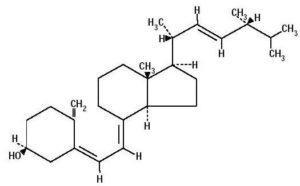Vitamin D has been implicated in numerous immune functions such as activating naïve T cells, regulating gene expression and also plays a role in the proliferation and differentiation of cells.
Antigen presenting cells and lymphoctyes express 1-α hydroxylase which is used to convert serum 25-hydroxyvitamin D (25OHD) to 1,25-dihydroxvitamine D, which is its active form. Vitamin D has also been implicated in immunomodulatory mechanisms which include driving Th2 responses.
People who are have a 25OHD deficiency are more susceptible to infections such as tuberculosis and other respiratory infections. One of the oldest treatments for tuberculosis was exposing a patient to the sun for extended periods of time. Vitamin D supplements have also been found to help in protecting individuals from respiratory tract infections.
HIV-infected individuals may have weaker immune systems and it has been found that 25OHD deficiency in these individuals is associated with a worse prognosis. Therefore, scientist have hypothesized that vitamin D levels may be able to impact the response individuals have to vaccines. The mode of action would be through Vitamin D-induced immunomodulation.
Therefore, scientists, led by Laura Richert, investigated what effect Vitamin D had on hepatitis B (HBV) and Streptococcus pneumoniae vaccination in individuals with HIV. The researchers recruited 339 HIV-infected participants who were on antiretroviral treatment and gave them the HBV vaccine and also recruited 25 HIV-infected patients also on treatment and gave them the Streptococcus pneumoniae vaccine.
The scientists measured the levels of 25OHD in each of the participants using a radioimmunoassay method. The immune response to the different vaccines was also quantified in the individuals. Using logistical modelling, the researchers adjusted for variables such as sex, age and smoking status.
The data revealed that there was no positive correlation between the levels of 25OHD in the blood and the immune response to the two vaccinations. Other studies have shown similar results: Vitamin D levels in the blood did not positively correlate with responses to influenza vaccination.
This study was conducted in HIV-infected individuals and therefore may not be applicable to the general population but it does shed light into the role and limitations of Vitamin D in regards to the immune system.
Article by Thandeka Moyo












